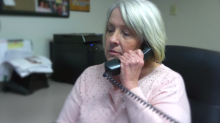Get to Know a Grantee: Midwest Youth Services
Body
The Family and Youth Services Bureau (FYSB) funds hundreds of runaway and homeless youth programs throughout the U.S. and its territories. Not only do the organizations that operate these programs receive different types of grants, either a single grant under one of FYSB’s four programs — Basic Center, Street Outreach, or Transitional Living (including Maternity Group Homes) — or more than one type of grant, but they also serve different populations of youth, are situated in a variety of settings, and are located in different parts of the country with different environments, cultures, and norms. To illustrate the great variety of youth-serving grantees, to share their insights on the work that they do, and to inspire collaboration and the sharing of experiences and ideas, the RHY Clearinghouse developed the Get to Know a Grantee series. We’ll regularly share responses from grantees to some basic questions in the hope that you’ll learn more about the needs of runaway and homeless youth or, if you’re a grantee, that you’ll find some new approaches or ideas to inspire the work you do on behalf of vulnerable youth in your community. Contact us if you’d like to be featured.
Midwest Youth Services (Jacksonville, IL) Basic Center Program
Today’s featured grantee is Midwest Youth Services (MYS) in Jacksonville, IL. Earlier in 2018, MYS received the Not-for-Profit Business of the Year Award from the Jacksonville Area Chamber of Commerce. Ann Hungerford, a case manager with MYS, answered our questions.
How long have you had a FYSB grant?
More than 20 years. We began providing services to runaway and homeless youth in 1978.
What other sources of funding are essential to your program?
We rely heavily on state, federal, and local funding as well as on donations.
What’s the primary need of homeless youth in your community?
There is a need for recognizing the signs of homelessness. We need to have greater awareness of the signals that might identify a need for crisis intervention services, including couch hopping/extended stays at a friend’s house, changes in behavior, lack of hygiene, consistently missing school or being tardy, lack of school preparation, or a lack of school records/immunizations. The signs of homelessness vary from youth to youth.
We also need people who will see them through the period of crisis and help them find solutions and resources to resolve the things that led to them being homeless. These people can be mentors, aftercare volunteers, tutors, or more, providing family and individual supports and referral services as necessary.
What has been your most important collaboration with a local partner?
Midwest Youth Services collaborates with many local agencies, including schools, police departments, mental health centers, probation, municipal court, and youth-serving community centers. We have also developed quite a few community-based committees and boards with key stakeholders (including people from schools, court systems, the mayor’s office, and probation offices) to develop a strategy for addressing youth homelessness through awareness, referrals, and problem-solving. The Area Planning Board assesses community need and makes plans for changes to combat youth delinquency. We have found that youth delinquency and youth homelessness frequently go hand in hand and both correlate with situational circumstances such as poverty, low school performance, lack of stable housing, family conflict, etc. We also established a prevention committee and a collaboration committee. As a community, we employ prevention tactics that are youth focused to help combat the increase in youth homelessness. The Collaboration Committee works to strengthen our community partnerships so we, as a community, are able to provide wraparound services to our youth.
What sets your organization apart from other similar organizations?
We are a smaller agency. We offer free and confidential services to any youth and/or their families at no cost to them. We provide 24-hour crisis response to runaway, homeless, and at-risk youth. In addition to our crisis services, we offer aftercare, case management, and referrals as needed. We assist youth in strengthening the protective factors that they value most, including housing, school attendance and grades, coping skills, employment, and goal setting.
I would also add that our staff have a passion and niche for what they do. Any time an opportunity presents itself to allow us to further serve our youth, each staff member brings a unique ability to our team efforts at planning, collaboration, support, and programming.
What do you wish more people in your community (or the country) understood about youth homelessness?
That youth homelessness is not always a choice that they make. It can be situationally led, and easily misunderstood. Youth homelessness can also be hidden behind many other problems, including mental health issues and family conflict. I wish people understood that the drivers for youth homelessness are complex and that it takes an entire community, working intentionally, to support youth, families, and neighborhoods.
Answers have been edited for clarity.
